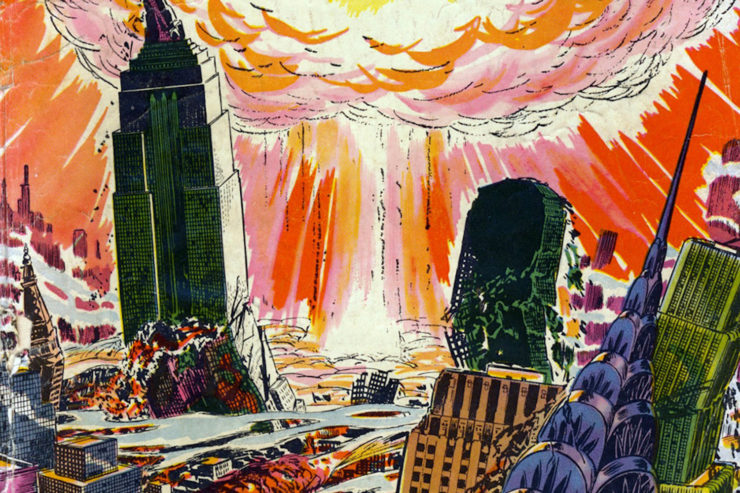Some of you might find the concept of hostility between different modes of government (such as those of, say, the US and Russia) as outdated as Ottoman and Hapsburg rivalries. But back in the day, the Cold War was a source of inspiration to many SF authors. A number of authors speculated as to what would happen if the US government were subverted or overturned by conquest. Too bizarre to contemplate? Not so, as these five Cold War classics show.
The Mouse That Roared by Leonard Wibberley (1955)
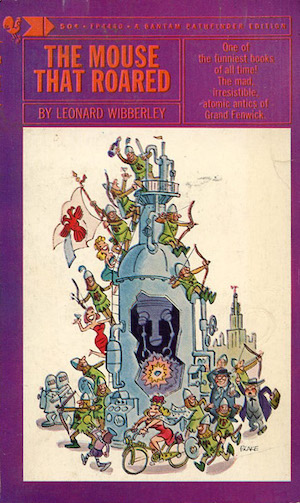
The Grand Duchy of Fenwick is an unlikely world power, being as it is a low-population, land-locked pocket kingdom whose meagre economy is dependent on the export of a single luxury product, Pinot Grand Fenwick. The Grand Duchy’s bold scheme depends on their weakness.
Faced with economic calamity thanks to a knock-off wine brand, the Grand Duchy dispatches a small, poorly armed expedition to provoke the US into a short, one-sided war the Duchy expects to lose, following which ample foreign aid will no doubt flow into Grand Fenwick’s coffers. It is a perfect plan. Too bad for its architects that Tully Bascomb and his longbowmen inadvertently deliver into Grand Fenwick’s hands the all-powerful Q-bomb prototype and with it, global domination for which the tiny nation is entirely unprepared.
Some of you may be astounded to discover that the Peter Sellers movie was based on a book. Others may need a refresher on the Marshall Plan, a successful American program that shapes Grand Fenwick’s optimistic post-war expectations.
Not This August by C. M. Kornbluth (1955)
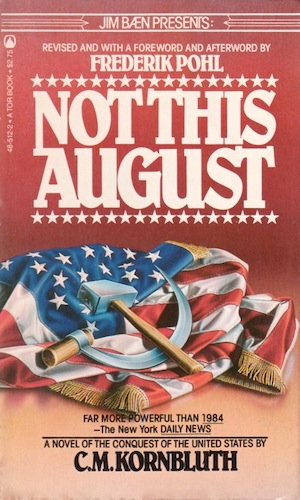
Despite their best efforts, American and Canada were no match for a Soviet Union and China yoked together by a shared devotion to Communism. The United States (and presumably Canada) vanishes. Americans previously unaccustomed to defeat find themselves living in the North American People’s Democratic Republic. Or rather, those Americans who are not immediately liquidated as potential threats to the State.
Since the US was unable to defeat the Communist alliance when America was at full strength, freeing itself as an occupied nation appears impossible. Billy Justin accepts this and plans to keep his head down. Yet one final American ultimate weapon still remains, on which American freedom fighters pin their hopes. Billy is drawn into the resistance, an act of patriotism that may sign his death warrant.
WOLVERINES! Sorry, that’s a different work. It is best not to ask about the logistics of invading the US from Eurasia.
As one might expect from the sunny optimist Kornbluth, any American victory isn’t going to bring about an age of global peace. It will merely shape the next inevitable cycle of total war. So will defeat.
Arslan by M. J. Engh (1976)
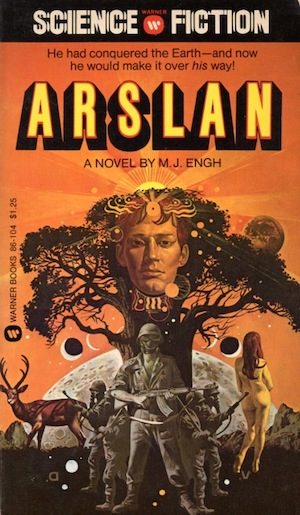
Having conquered the world in a military campaign as effective as it is implausible, Turkistan warlord Arslan selects for his capital the unremarkable US community of Kraftsville (also implausible, but plot rules). Unrepentant war criminal Arslan has the upper hand as soon as he arrives and meets no meaningful resistance as he reorders Kraftsville and the world beyond to fit his lofty vision.
Arslan would argue that his goal justifies his means, that no sacrifice is too large provided he succeed in the end. It’s a claim many narcissistic sociopaths have made before. Arslan can at least claim a goal of greater than Biblical proportions: where an angry God spared only an ark’s worth of humans, Arslan may not spare any.
Even by the standards of the Disco era, whose works were often rather troubling when it comes to depictions of sexual abuse and assault (Thomas Covenant to the courtesy phone, please), Arslan (character and book) is focused on rape to a disturbing degree. It is as though a man determined to reshape the world to his singular vision has no respect for any sort of boundary. The book is both memorable and extraordinarily off-putting.
Emerald Eyes by Daniel Keys Moran (1988)
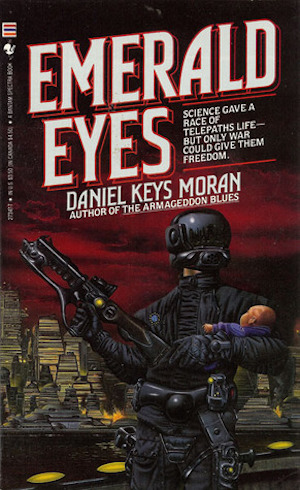
Dreading a Malthusian apocalypse, United Nations idealists transformed the United Nations from a mere debating club to a legitimate world government. Not every nation peacefully acquiesced to this transformation. The United States of America did not. Like every other reluctant nation-state, the US lost the ensuing conflict. The country is now part of the world order, if a very reluctant, very resentful one.
By the time genetically engineered telepath Carl Castanaveras is an adult, UN idealists have been replaced by pragmatists more focused on personal power than the greater good. To UN functionary Jerril Carson, Carl and his ilk are assets if loyal, and threats to be eliminated if disloyal. Carl yearns for freedom. The only manumission Jerril cares to deliver is death.
It is a little-known fact that the US’ Armed Forces are large, well-funded, and well-equipped. Presumably mistakes were made between 1988 and the UN war that tipped the balance of power away from the US. UN efforts to mitigate the consequences of overpopulation are unsuccessful enough to raise the question of whether they fell short because the problem was too big to fix or whether the UN itself actively made things worse.
Black Star Rising by Frederik Pohl (1985)
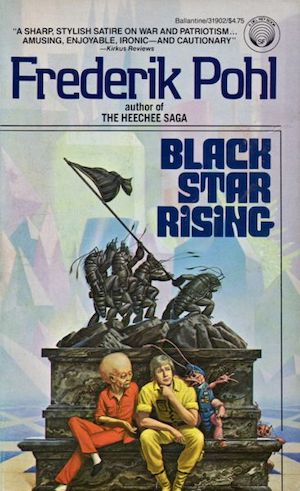
Mistakes were made, buttons were pushed, and both the Soviet Union and the United States of America vanished in nuclear fire. China and India, having sat out the war, became the world’s new masters. The remnants of the United States were granted China’s gracious mentorship. Bucolic natives like protagonist Castor have their productive potential realized in facilities such as Castor’s own Heavenly Grain Rice Collective.
Much to China’s alarm, it is contacted by heavily-armed, bellicose aliens somehow allied to the long-vanished US demanding to speak with the American president. The last American president having died with America, this seems an impossible request to satisfy. However, refusal will result in global obliteration. Thus Castor, in the wrong place at the wrong time, is elevated to an office that had vanished before he was born. In President Castor’s untrained hands lies the fate of humanity.
China would argue with some logic on their side that they didn’t invade the US. There was no America to invade by the time China took over North American governance. Americans might have debated the point if the tiny remnant had not been too busy trying to survive in the aftermath of WWIII.
***
Despite the fact the US has never been successfully invaded and occupied by an external army (let’s just forget the ambiguity that is the War of 1812 and oh, the raid of Pancho Villa), the possibility that it might be is…mere intriguing plot fodder. Five books are only the tip of the iceberg. If I missed your favourites, comments are, as ever, below.
In the words of fanfiction author Musty181, four-time Hugo finalist, prolific book reviewer, and perennial Darwin Award nominee James Davis Nicoll “looks like a default mii with glasses.” His work has appeared in Interzone, Publishers Weekly and Romantic Times as well as on his own websites, James Nicoll Reviews (where he is assisted by editor Karen Lofstrom and web person Adrienne L. Travis) and the 2021 and 2022 Aurora Award finalist Young People Read Old SFF (where he is assisted by web person Adrienne L. Travis). His Patreon can be found here.










